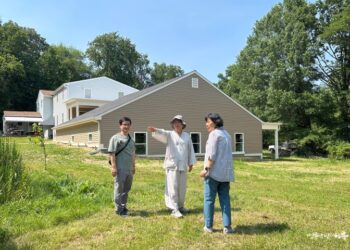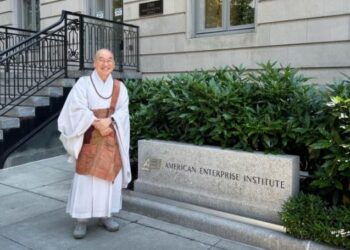Jun 5, 2025 – Day 2 in Laos, Visit to Wat Ong Teu Temple
Hello. Today is the second day of visiting Laos.
After completing morning practice and meditation, Sunim headed to Wat Ong Teu Mahawihan Temple located in downtown Vientiane.
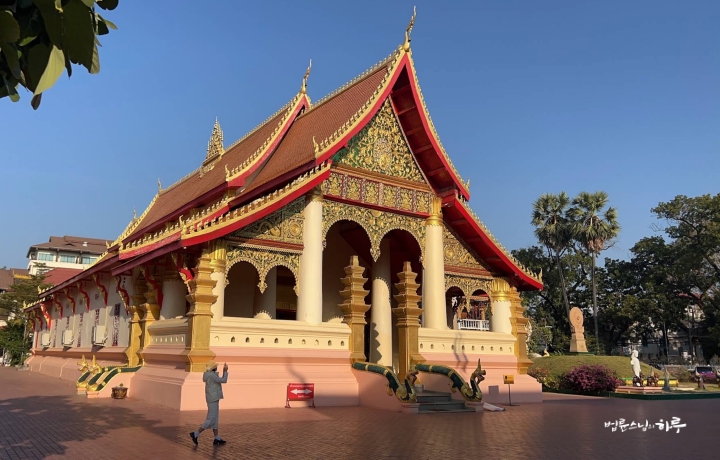
When Sunim arrived at the temple, Sayadej Vongsopha warmly welcomed him. Sayadej Vongsopha participated in the 2013 INEB Study Tour and visited Jungto Society. In 2023, Sunim visited this temple and had a conversation with him.
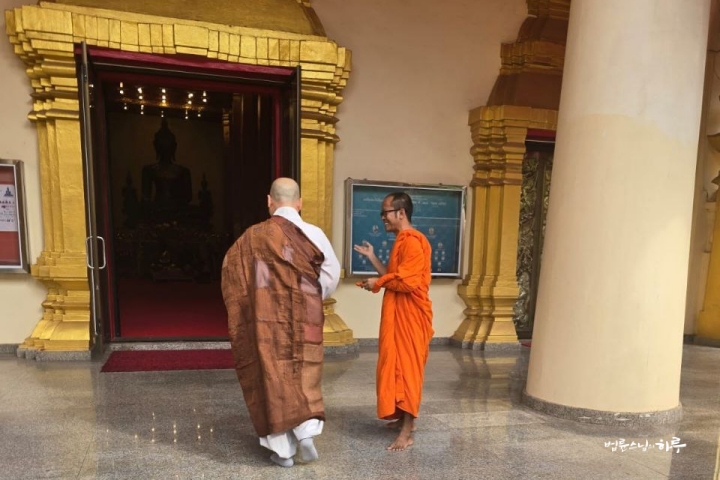
Wat Ong Teu Temple was established in 1563 when the capital of Laos was moved to Vientiane. It houses a bronze Buddha statue (Ong Teu) measuring 5.8m in size and weighing 12,000kg. It is also a place where many monks study Buddhism, as it has one of only two monastic universities in Laos that are equivalent to regular universities.
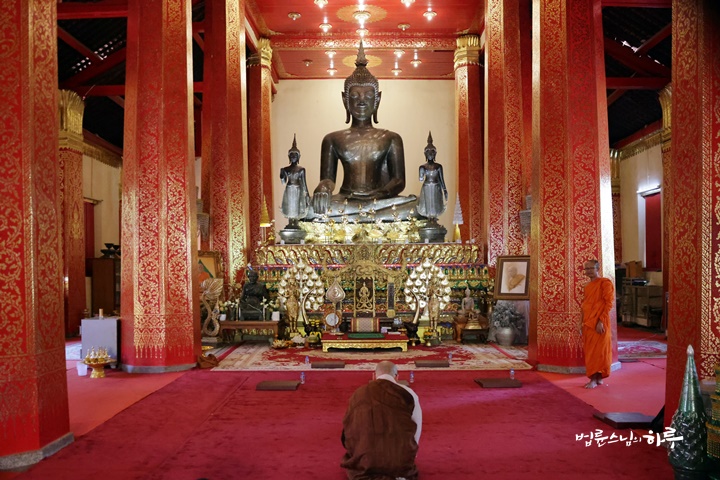
Sunim first paid respects to the Buddha statue and then had a pleasant conversation with Sayadej Vongsopha. Sayadej Vongsopha said he runs the monastic university here and teaches Buddhism to many monks.
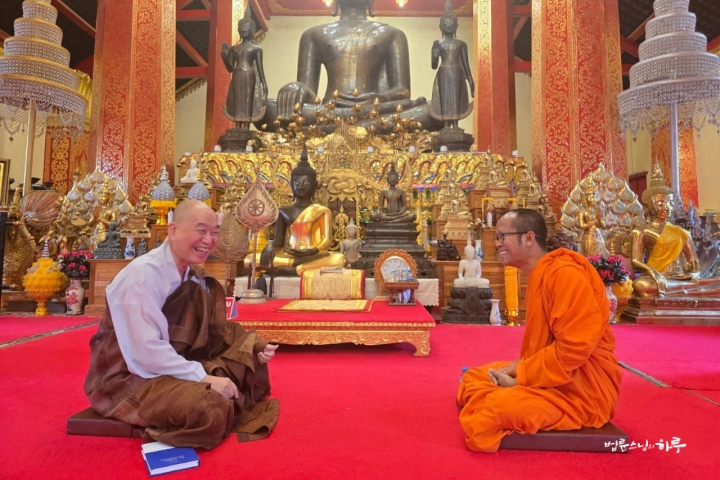
“Visiting and studying at Jungto Society in 2013 was really helpful for my Buddhist activities.”
“When you come with the INEB delegation in June, please share many stories about your activities and achievements.”
“I will do that.”
After the conversation, Sunim presented his English publication “Buddha the Revolutionary” as a gift.
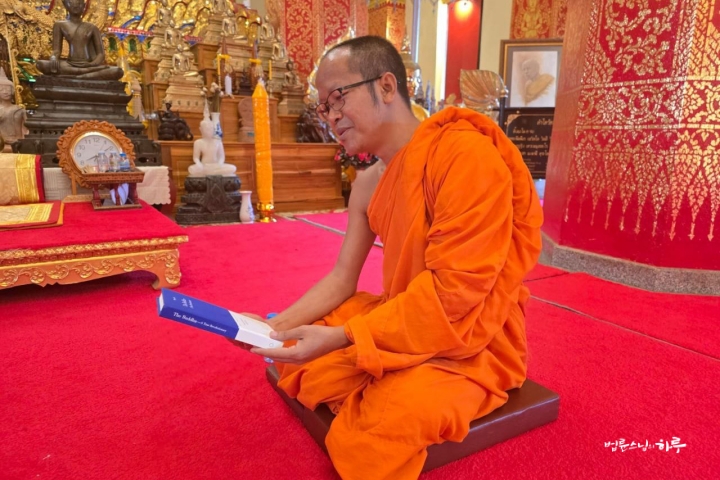
“This is a book that compiles my Dharma talks about the revolutionary aspects of Buddha’s life that transformed society. We need to study Buddha’s life to bring about Buddhist social practice.”
“Thank you. I will read it thoroughly.”
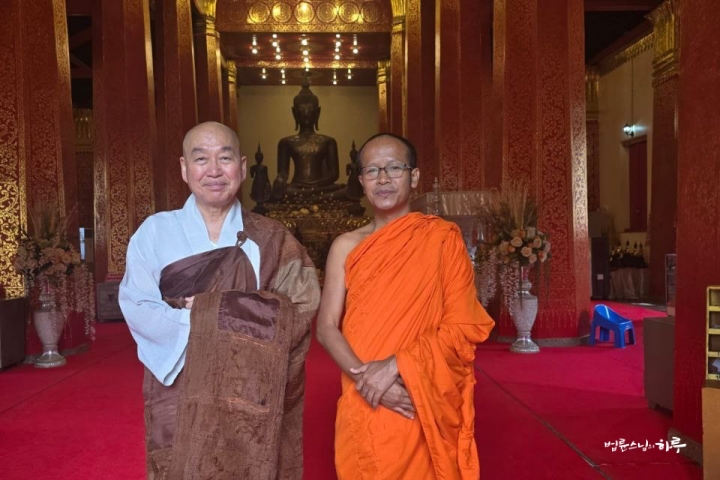
After leaving the temple, Sunim had scheduled meetings throughout the day. By the time the meetings were over, the sun had set.
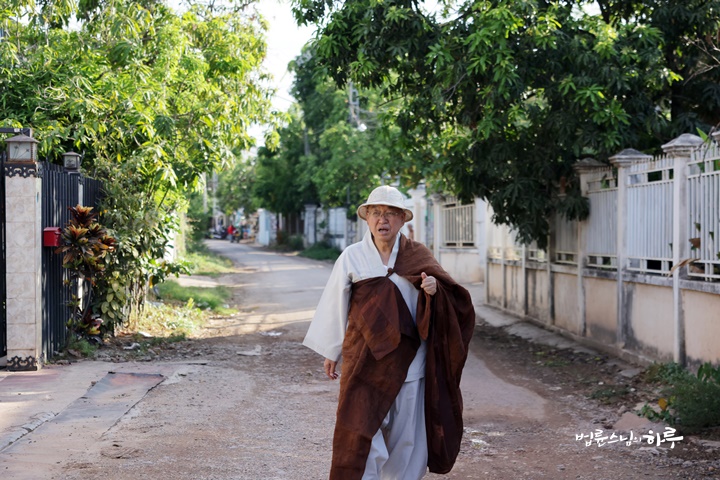
Since there was no Dharma talk today, I’ll conclude by sharing a conversation between Sunim and a questioner from last Friday’s Dharma Q&A.
How Should I Practice When I Can’t Control My Shopping Urges?
“First, you need to think about ‘where to set the standard.’ When questioning your behavior and life attitude, it varies depending on what standard you use. You need to decide first whether to use the standard of a practitioner or that of an ordinary citizen.
If we use the standard of an ordinary citizen, you don’t have a big problem. In this case, problems arise when someone steals or takes others’ belongings, or when excessive consumption leads to debts that can’t be repaid later, causing harm to others. In such cases, even by ordinary citizen standards, it could be seen as a lack of qualification. However, if you’re not creating conflict with your husband and are enjoying shopping within your financial means like you are now, there’s nothing particularly problematic.
People spend money on various hobbies. Some spend on drinking, others on golf, jewelry, paintings, or tea, and some buy expensive clothes. They call these hobbies high-quality cultural activities, not consumption addiction. You can also see your behavior of buying things you like, then exchanging them the next day, buying and exchanging again, as a kind of entertainment. Since you have time, your husband doesn’t complain, and you’re not going into debt, there’s nothing particularly problematic. So I don’t think you need to worry too much about it.”
“Then what should I do with all the accumulated items?”
“Items you buy but don’t use can be sorted once a month and taken to the ‘Recycling’ space on the 7th floor of Jungto Social and Cultural Center. Alcohol disappears when you drink it, but items just take up space when accumulated. Since donated items at the recycling center can be used by people who need them, there’s no problem. So it’s not something worth worrying about.
Second, why did this habit develop? For example, while a regular bicycle costs a few hundred thousand won, in bicycle clubs, some people ride bicycles worth tens of millions of won. In motorcycle clubs, some ride motorcycles worth hundreds of millions of won, and in tea clubs, some boast about tea worth tens of millions of won per set. Coffee and wine enthusiasts are the same. Some people fill their basements with wine barrels.
Viewed positively, it’s a hobby, but viewed negatively, it’s all addiction. This addiction arises from emptiness. When the mind feels empty, behaviors to fill it appear. Children continuously playing games or endlessly watching YouTube or TV are all addictions. People who are busy or have lots to do don’t even have time for such things. Ultimately, addiction comes from emptiness of mind.
Your repeated behavior of continuously buying things and returning them is the same. It’s because there’s an empty space in your mind. The emptiness that started from material deprivation in childhood remains in your mind, and you’re trying to fill it by endlessly buying things. For example, if someone did well in school until middle school but their parents prevented them from going to high school or college because they were female, they might have an inferiority complex about education. Such people often continuously pursue education when circumstances improve later. Among elderly people who study hard, many have inferiority complexes about educational background. The mind that wants to compensate for the lack of education keeps arising.
This attitude of obsessing over one thing is called ‘addictive tendency.’ The root of addictive tendency is in the emptiness of mind. When there’s an empty space inside, addictive tendency develops, and when that space is filled, the addictive tendency naturally disappears. What about the psychology of smoking? Imagine a writer smoking. Do they smoke when writing flows smoothly? No. They reach for cigarettes when writing doesn’t flow well and they’re stuck. It’s the same with alcohol. People drink or smoke when they’re stressed. Thus, addiction arises from emptiness or frustration.
Practice plays the role of filling this empty space in the mind. That’s why when you become a practitioner, addictive tendencies naturally decrease or disappear. It’s partly because you’re too busy volunteering, but more fundamentally, it’s because the inner emptiness gradually gets filled during the practice process. So habitual behaviors naturally decrease or disappear. You also need to be aware that your current behavior is an addictive tendency.
Third, practitioners must be free from all habits. Practitioners must be free even from good habits. Acting habitually means being dependent. But what you’re doing isn’t even a good habit. Especially in times of serious environmental crisis like now, excessive consumption is an addiction and close to a social crime. As a practitioner, it’s a habit that must be corrected. Of course, from an ordinary citizen’s perspective, it’s not a big mistake, so you don’t need to feel guilty. But you should clearly keep in mind that it’s not something to be praised for either.
In such cases, it’s good to actively volunteer, come to the Dharma center to listen to Dharma talks and practice, and heal childhood trauma. As you immerse yourself in volunteering, the time and energy spent on shopping naturally decreases, and in that process, the emptiness of mind gradually gets filled. Habitual behaviors gradually weaken when stopped for a certain period. Also, when you fill your inner self with meaningful work or practice, habitual tendencies automatically decrease. If you unconsciously buy things habitually, don’t blame yourself, and when you become aware, donate them to the recycling center even the next day. Then people who need those items can use them.”
“When I see discounted items at the store, even if I don’t particularly like them, I end up buying several and storing them. But later, unpleasant feelings rush in along with self-blame thinking ‘Why did I buy these?’ and I eventually throw them away. That’s why I felt guilty, but from now on, even if I buy unnecessary items, I’ll donate them to the recycling center the next day.
I haven’t had my mother by my side since elementary school. Perhaps because of that influence, there always seems to be an emptiness in a corner of my heart. That emptiness disappears when I volunteer, but when I’m alone at home, loneliness rushes in and I can’t spend time meaningfully. As a result, I repeatedly waste time wandering around marts. I’ve thought about ‘volunteering all week if my physical strength allows,’ but seven days would be difficult because I need to prepare meals for my children and do housework. So I’m trying to volunteer three days a week and spend the remaining four days with that fulfilling energy. The problem is that it’s difficult to recognize my state in time.”
“If you can be aware of your state and control yourself, you can live well on your own. But if you can’t control it, it’s better to come out to volunteer all week for the time being. For example, if you can’t quit alcohol, you need hospital treatment, and if you can’t control drug use on your own, you need to forcibly quit by changing your environment. It’s the same when children are addicted to phones or games. Simply telling them not to do it creates resistance and only increases conflict. In such cases, you need to take them to travel destinations without internet. At first, they feel frustrated and cry, but they have to adapt to that environment. After adapting and returning to daily life, they can control themselves to some extent. Because they’ve had the experience of ‘living without it.’ Based on that experience, if you control them by setting time limits, they can regulate to some extent. But if they’ve been doing it for 10 hours and you suddenly tell them to reduce to 2 hours, it’s very difficult to fix.
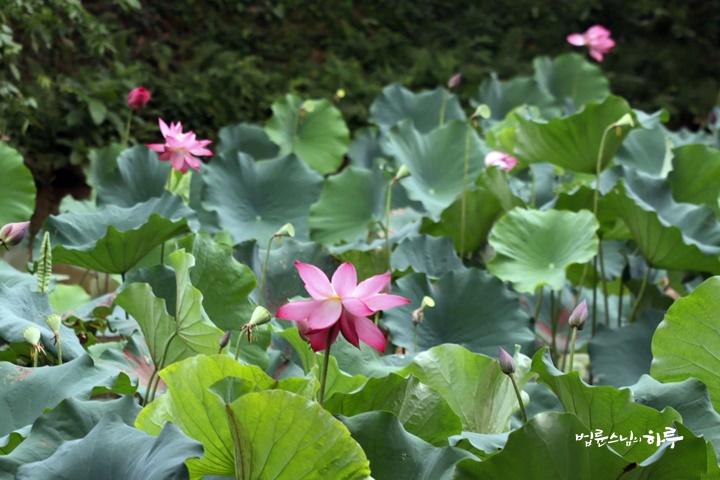
When you try to fix overeating habits by eating less, it doesn’t work well, does it? In such cases, fasting is a powerful prescription to start with. Only after experiencing that even one spoonful feels like a great blessing and that you can survive on just that, does eating less become easier. It’s the same when trying to switch from meat to vegetarian food. You need to fast for at least 21 days to clear out existing eating habits, and when you start eating again, avoid all meat completely. This makes it somewhat easier to change your constitution.
Similarly, if you want to break free from your habitual consumption patterns, it’s good to volunteer every day for a week first. If housework or childcare makes it difficult, discuss with your family and ask your husband for help. If that’s difficult, volunteer consistently for one month, two months, or three months, or even better, join the 100-Day Chulga program to remove ingrained habits to some degree. Of course, when you return home, it’s easy to fall back into old habits, but from then on, with just a little effort, some level of self-control becomes possible. This way, you can solve the problem by changing your environment and conditions.”
“Yes, thank you.”
Sunim will stay in Laos tomorrow as well, complete his scheduled activities, and then return to Korea on a night flight.



